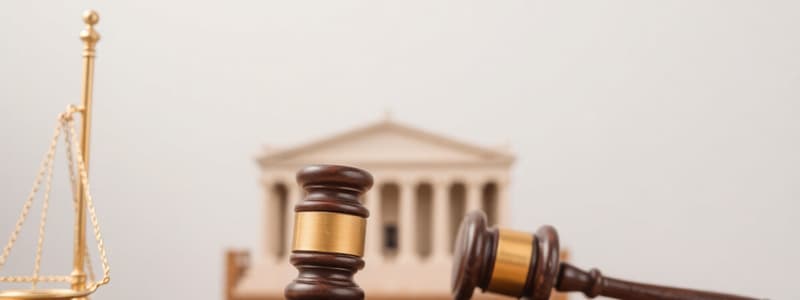Podcast
Questions and Answers
What is the primary purpose of the Judicial Appointments Commission (JAC) established by the Constitutional Reform Act 2005?
What is the primary purpose of the Judicial Appointments Commission (JAC) established by the Constitutional Reform Act 2005?
- To directly appoint judges to the Supreme Court
- To oversee the legislative process of judicial matters
- To serve as a judicial review body
- To make decisions on judicial candidates for the Lord Chancellor (correct)
Which of the following best describes the role of the Lord Chancellor after the Constitutional Reform Act 2005?
Which of the following best describes the role of the Lord Chancellor after the Constitutional Reform Act 2005?
- He acts solely as the Speaker of the House of Lords
- He is responsible for appointing new judges without any limitations
- He remains the head of the judiciary in England and Wales
- He has no more significant powers than any other Cabinet minister (correct)
What significant change was made to the position of Law Lords as a result of the Constitutional Reform Act 2005?
What significant change was made to the position of Law Lords as a result of the Constitutional Reform Act 2005?
- They were given more authority in the legislative branch
- They transitioned into a new role within local government
- They were completely abolished in favor of a new Supreme Court (correct)
- Their powers were expanded to include executive functions
Judicial independence is essential because it ensures that the judiciary:
Judicial independence is essential because it ensures that the judiciary:
The Constitutional Reform Act 2005 aimed to strengthen the separation of powers by addressing which of the following?
The Constitutional Reform Act 2005 aimed to strengthen the separation of powers by addressing which of the following?
What institutional guarantee contributes to judicial independence?
What institutional guarantee contributes to judicial independence?
What does the judicial independence require from the relationship between courts and other government branches?
What does the judicial independence require from the relationship between courts and other government branches?
How did the Constitutional Reform Act 2005 alter the powers of the Lord Chancellor?
How did the Constitutional Reform Act 2005 alter the powers of the Lord Chancellor?
Flashcards
Judicial Independence
Judicial Independence
The principle that judges should be free from political influence when making decisions.
Constitutional Reform Act 2005
Constitutional Reform Act 2005
UK law that reformed the relationship between the judiciary and other branches of government, strengthening judicial independence.
Lord Chancellor
Lord Chancellor
Previously held significant roles in legislature, executive and judiciary; now a cabinet minister.
Judicial Appointments Commission (JAC)
Judicial Appointments Commission (JAC)
Signup and view all the flashcards
Separation of Powers
Separation of Powers
Signup and view all the flashcards
Rule of Law
Rule of Law
Signup and view all the flashcards
Supreme Court
Supreme Court
Signup and view all the flashcards
Institutional Guarantees
Institutional Guarantees
Signup and view all the flashcards
Study Notes
Public Law I - Sources of Power: Judicial Independence
- Key objective is understanding judicial independence.
- Importance of judicial independence lies in its essential role for a fair and just legal system.
- Institutional and individual guarantees protect judicial independence.
- Reforms introduced by the Constitutional Reform Act 2005 aimed at enhancing judicial independence.
Judicial Independence
- Judiciary functions as a separate branch of government, distinct from the legislative and executive branches.
- Judiciary is non-political, not elected.
- Judiciary is independent from political pressures.
- Independence of judiciary is crucial for preventing governmental pressure.
- Strong separation of powers between courts and other branches is essential for judicial independence.
Institutional Guarantees
- Constitutional Reform Act 2005 established the rule of law and judicial independence on a statutory basis.
- Equivalent provisions are present in Scottish and Northern Irish legislation.
- Key reforms resulted in changes to the Lord Chancellor's role, creation of a Judicial Appointments Commission, and the abolishment of the Law Lords to create the Supreme Court.
- Significant move toward a more defined separation of powers in the UK.
Constitutional Reform Act of 2005
- Lord Chancellor previously held significant powers across legislative, executive, and judicial branches.
- This Act reformed the Lord Chancellor's role, separating the executive and judicial roles.
- The Act established the Judicial Appointments Commission, replacing the previous method of appointing judges.
- Judges now hold the role to sit on the Supreme Court.
- The Act created statutory duties upholding judicial independence.
Appointing and Dismissing Judges
- The previous method of appointing and dismissing judges was shrouded in secrecy.
- The Judicial Appointments Commission (JAC) was established.
- The JAC makes decisions on candidates, which are then passed to the Lord Chancellor.
- The Lord Chancellor can accept, reject, or request reconsideration, but cannot propose new candidates.
- If a candidate is rejected, the Lord Chancellor must accept the next recommendation.
UK Supreme Court
- Created by the 2005 Act.
- Started functioning in 2009.
- Located outside the House of Lords.
- Has its own website.
- Not traditionally a constitutional court but has taken over some devolution issues.
Individual Guarantees - Security of Tenure
- Senior judges in England and Wales (E&W) hold office until retirement.
- Dismissal is possible on medical grounds or through the joint decision of both Houses of Parliament, recommended by the respective heads of government.
- Equivalent provisions exist in Scotland, with modifications determined by the recommendations of Scottish government.
Individual Guarantees - Other Aspects
- Salaries for senior judges are not subject to reduction.
- Judges have immunity from suit for words spoken in their judicial capacity (judgments).
Studying That Suits You
Use AI to generate personalized quizzes and flashcards to suit your learning preferences.




